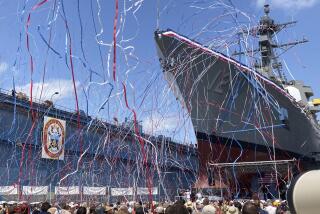The Joy of Victory Prevails in Bath : Workers at Maine Shipyard Toast New Navy Contract
- Share via
BATH, Me. — Call it the “Shipyard of Smiles.”
Ever since the announcement late Tuesday afternoon that the Navy had awarded Bath Iron Works a coveted $321.9-million contract to build the first of a new class of guided-missile destroyers, the 7,400 workers at the shipyard on the Kennebec River have been congratulating one another.
“Oh boy,” said Charles Brawn, 37, a security guard at the main gate. “This is the best news in years. It means I will be able to hang around long enough to retire out of here.”
Like many who work at 101-year-old BIW, Maine’s largest private employer, Brawn has several relatives working at the yard--a brother, three cousins and three uncles. He is a fifth-generation worker at BIW. Like him, many other employees are the sons and daughters, grandsons and granddaughters of shipyard workers.
It’s a Bath tradition. Over the entrance of the yard’s main gate is a sign in large letters that proudly proclaims:
“Through These Gates Pass The Best Ship Builders In The World.”
As workers filed out of the yard on their lunch break Thursday, pipefitter Mickey Meador, 37, said: “I knew we were going to get it. We’re the best. I told my wife and four kids the contract means we’ll have groceries on the table for years to come.”
Clifton Given, 51, a lead electrician and 26-year employee, said he felt sorry for the workers at Todd Shipyards in Los Angeles who would lose their jobs because the San Pedro yard didn’t get the contract. “I’d just as soon share the wealth,” he said.
James Blenkhorn, 50, BIW’s senior vice president of business and technical development, also said he felt deeply for the workers at Todd. “But that’s the way it is in a competitive marketplace,” he added. “For the life of me, I can’t understand why Todd bid the job so high--$91.5 million more than we bid.”
BIW bid $322 million, Todd $413.5 million and a third competitor, Ingalls Shipbuilding of Pascagoula, Miss., $344.5 million.
Bath, population 10,000, has been a shipbuilding port on mid-coast Maine since the 1600s, when the Virginia of Sagadahock, the first transatlantic vessel built in the New World, was launched on the banks of the Kennebec.
Since 1884, Bath Iron Works has built 420 ships, 190 of those for the Navy. During World War II, it built 80 destroyers, one every 17 days and more than any other shipyard in the nation. Since 1975, the yard also has been building 24 guided-missile frigates under a $1.9- billion contract, as well as the $305.2-million, 9,400-ton cruiser Thomas S. Gates. It is under contract to build four more of the cruisers.
“It would have been a sad day here if we had lost the contract for the Arleigh Burke,” said Blenkhorn, wearing a cap emblazoned with the name Arleigh Burke, the retired chief of naval operations for whom the new destroyer class is named. Burke, nicknamed “31-Knot Burke,” is fondly remembered for his World War II exploits as commander of a destroyer squadron.
Blenkhorn said that, had the contract been lost, BIW would have had to fire at least 2,000 workers within two years as the frigate contract winds down.
It will be two years before the shipyard begins construction on the Arleigh Burke. In the meantime, 250 to 300 employees in engineering, materials procurement, planning and management information systems will be busy preparing to begin the job.
By 1988, it is expected that 8,500 to 9,000 will be employed at the shipyard, an increase of between 13% and 19%.
William E. Haggett, president and chief executive of BIW and himself the son of a shipyard laborer, said that, as producer of the first ship of the class, his company will be in a commanding position to win a majority of the 28 other destroyers planned.
However, Ray Ladd, 34, president of the Industrial Union Marine Shipbuilder Workers of America, Local 6, which represents 4,500 of the 7,400 workers and is the biggest of the five unions in the yard, sounded a note of caution amid all the rejoicing.
“Our three-year contract is up June 30. We have not sat down to begin to negotiate. . . . If we are asked to take cuts in pay, we may be looking at a strike come June 30.”
But for now, the euphoria prevails. News of the Navy award electrified Bath, a New England seaport with row after row of 19th-Century brick buildings.
“I was ecstatic when I heard the news. So was everyone else,” said J. Michael Lydon, 41, town council chairman. “It means job security for years to come. It will have an impact on every business in town.”
More to Read
Inside the business of entertainment
The Wide Shot brings you news, analysis and insights on everything from streaming wars to production — and what it all means for the future.
You may occasionally receive promotional content from the Los Angeles Times.










